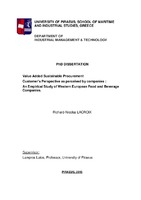Value added sustainable procurement customer's perspective as perceived by companies : an empirical study of western european food and beverage companies

Προβολή/
Θεματική επικεφαλίδα
Sustainable development ; Sustainable procurement ; European Union countriesΛέξεις κλειδιά
Procurement ; Food and beverages industryΠερίληψη
Σήμερα, οι αειφορικές προμήθειες θεωρούνται ως ιδιαίτερα δημοφιλής πρακτική για τις επιχειρήσεις, δεδομένου ότι εφαρμόζονται ως τμήμα μιας ευρύτερης αειφορικής στρατηγικής ή αποκλειστικά ως τμήμα της λειτουργίας των προμηθειών. Την τελευταία πενταετία οι αειφορικές προμήθειες εφαρμόστηκαν κυρίως σε τακτική βάση, στοχεύοντας κυρίως στη μείωση του περιβαλλοντικού κόστους σε δραστηριότητες προμήθειας με προμηθευτές. Πάντως, κατά τη διάρκεια της τελευταίας πενταετίας, πέραν της περιστολής του κόστους, η εφαρμογή των αειφορικών προμηθειών από τη Διοίκηση έχει συχνά καταστεί το πρόσχημα για την αποτελεσματική λειτουργική βελτίωση και τη δημιουργία νέων αειφορικών προϊόντων, την ανάπτυξη εξειδικευμένων αγορών (niche markets) και την αύξηση του μεριδίου αγοράς. Έτσι, οι αειφορικές προμήθειες έχουν καταστεί νέο μέσο της Διοίκησης για την υλοποίηση στρατηγικών που στοχεύουν στην απόκτηση των βέλτιστων δυνατών προμηθειών, κοινωνικά ή ηθικά αποδεκτών στους καταναλωτές, ενώ προστατεύουν το περιβάλλον από την ρύπανση και την εξάντληση, συνεπώς δε στη διατήρηση του συγκριτικού τους πλεονεκτήματος.
Σκοπός αυτής της διατριβής είναι η διερεύνηση των διαστάσεων του φαινομένου αυτού, ιδιαίτερα στο πλαίσιο της Δυτικής Ευρώπης, και η κατανόηση της ύπαρξης κάθε στρατηγικού προσανατολισμού στη λήψη συναφών αποφάσεων. Προκειμένου να προσεγγίσουμε το αντικείμενο με τον καλύτερο δυνατό τρόπο, καταγράψαμε την έκταση αυτής της εφαρμογής στις δραστηριότητες των επιχειρήσεων και μελετήσαμε τα χαρακτηριστικά των αποφάσεων και την συμπεριφορά αυτών των επιχειρήσεων ως προς τις πράσινες προμήθειες. Αυτό επετεύχθη, από τη μία πλευρά με τη διεξαγωγή έρευνας με τη χρήση ερωτηματολογίων που απεστάλησαν ηλεκτρονικά σε επιχειρήσεις ποτών και τροφίμων που λειτουργούν στη Δυτική Ευρώπη, και από την άλλη με τη διεξαγωγή follow-up συνεντεύξεων προς επιβεβαίωση και
περαιτέρω σε βάθος αναζήτηση πληροφορίας που δεν λαμβάνεται ευχερώς μέσω ερωτηματολογίων. Τα αποτελέσματα της έρευνας μας επιτρέπουν να διερευνήσουμε θεμελιώδεις παραδοχές θεωριών που εφαρμόζονται στις αειφορικές προμήθειες επιχειρήσεων. Αυτό μας οδήγησε σε αριθμό συμπερασμάτων που αφορούν τη συμπεριφορά των επιχειρήσεων σε επιτυχώς εφαρμοσμένες αειφορικές προμήθειες, τα προβλήματα και τη στρατηγική διάσταση αυτών των αποφάσεων και την εφαρμογή αντίστοιχων θεωριών σε δυτικοευρωπαϊκές επιχειρήσεις τροφίμων και ποτών. Τα κύρια συμπεράσματα της μελέτης αναφέρονται στη συνεχώς αυξανόμενη χρήση των αειφορικών προμηθειών των επιχειρήσεων που λειτουργούν στη Δυτική Ευρώπη, στην αξιοσημείωτη υιοθέτηση των αειφορικών προμηθειών και την αναγκαιότητα εφαρμογής μιας σύμμειξης θεωριών για την εξήγηση της συμπεριφοράς των επιχειρήσεων ως προς το ζήτημα των αειφορικών προμηθειών.
Τελικά, με βάση τα συμπεράσματά μας και τις βέλτιστες πρακτικές της διεθνούς συναφούς βιβλιογραφίας, δημιουργήσαμε επιρροές που συμβάλλουν στη μείωση πιθανών απωλειών και αύξηση κερδών των επιχειρήσεων από τη χρήση των αειφορικών προμηθειών.


